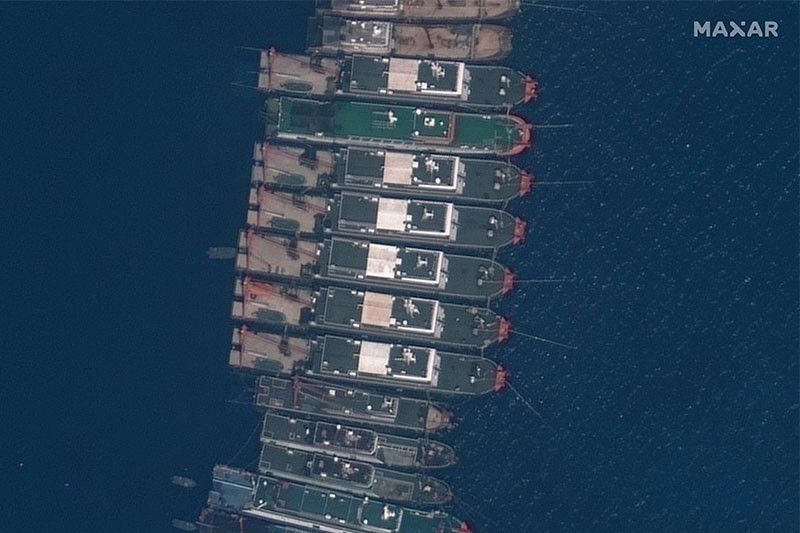Damage caused by China in West Philippine Sea could affect food security — scientists

MANILA, Philippines — A group of scientists on Friday warned that China's destructive activities in the West Philippine Sea could imperil the Philippines' food security if left unabated.
The warning comes as hundreds of ships suspected to be part of China's maritime militia continue to swarm reefs and artificial islands in the West Philippine Sea, the part of the South China Sea within the Philippines' exclusive economic zone.
In addition to condemning Beijing's "clear violations of our national sovereignty," the Advocates of Science and Technology for the People (AGHAM) sounded the alarm over the incursion's "possible consequences not only to the environment but also to fisheries production and fisherfolk welfare."
AGHAM said the damage wrought by China on the reefs and fisheries "may affect the food security of the country if they continue their activities in the area."
'Damage to reefs could cost over P30 billion each year'
"With China’s illegal encroachment, fishes and other marine species are bound to lose their habitats as reclamation and the building of military bases has destroyed at least 16,000 hectares of reefs as of 2017," AGHAM said.
The group added that the "rampant poaching" of giant clams could affect reefs, the damage to which is estimated to cost the Philippines up to P33.1 billion annually.
"China’s rampant demonstration of their dominance in the West Philippine Sea is also sending a strong message that they will not allow our country to develop our own natural resources within our territorial rights."
'More than 600,000 jobs in jeopardy'
The group added that 627,000 fisherfolk could lose their livelihoods as a result of Beijing's continued aggression against them, citing past encounters and a law recently passed by China allowing its coast guard to fire on foreign vessels in contested waters.
It further warned that Filipino marine scientists conducting studies in the West Philippine Sea could also face harassment. This would threaten scientific work that is "vital to fisheries management."
"We would like to remind the Duterte administration of its obligation to the Filipino people to defend our national sovereignty," AGHAM said.
"It would be a disservice to the Filipino people if the current administration continues to kowtow to China’s demands. Instead we must take advantage of our victory at the Permanent Court of Arbitration in 2016, and continue to assert our rights to develop our national patrimony for the country’s economic development."
What is this about?
Tension over China's outsized presence in Philippine waters flared up again last month when the National Task Force for the West Philippine Sea (NTF-WPS) reported that 220 vessels believed to be part of China's maritime militia were spotted moored within the vicinity of Julian Felipe (Whitsun) Reef.
The NTF-WPS on Wednesday said some of these vessels dispersed to other areas in the West Philippine Sea.
The following day, China's Foreign Ministry spokesperson Hua Chunying insisted that "the overall situation in the South China Sea is stable at present."
"The Niu'e Reef is part of China's Nansha Islands," she said, using China's name for Julian Felipe Reef, which is well within the Philippines' EEZ.
"It is an important shelter from the wind for Chinese fishing boats traditionally. So it is completely normal for Chinese fishing ships to take shelter near the reef from rough sea conditions."
The NTF-WPS maintains that the boats are actually part of China's maritime militia. The task force also flagged possible illicit activity from the same vessels and warned that they could be causing irreparable damage to the marine environment in the area.
The Philippines filed a diplomatic protest over the incursion in March and the military has conducted three rounds of routine aerial and maritime sovereignty patrol missions in the area.
World powers such as the United States, European Union, Australia, Japan, United Kingdom, Canada and New Zealand have expressed support for the Philippines, calling on China to adhere to rules-based order consistent with international law, including the Convention on the Law of the Sea.
But Beijing has repeatedly scorned such calls from the international community, with Hua on Thursday saying that "[s]ome forces never miss any chance in their attempt to drive a wedge between China and the Philippines."
"We are sure the Philippines can tell facts from fallacy and won't fall for their tricks," she also said.
Foreign Affairs Secretary Teodoro Locsin Jr. is currently in China along with three other foreign ministers from the Association of Southeast Asian Nations at the invitation of State Councilor and Foreign Minister Wang Yi. He arrived on March 31 and is expected to fly home on Friday.
No statement has been issued yet on what transpired during the visit.
- Latest
- Trending

































